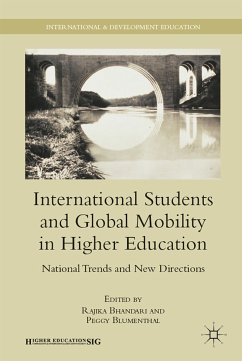
Transnational German Education and Comparative Education Systems (eBook, PDF)
Research and Practice
Redaktion: Nickl, Benjamin; Blackler, Deane; Popenici, Stefan
Versandkostenfrei!
Sofort per Download lieferbar
72,95 €
inkl. MwSt.
Weitere Ausgaben:

PAYBACK Punkte
36 °P sammeln!
This book presents an in-depth look at the state of transnational education and comparative perspectives on education systems between Germany and other nation states. It explores how a transnational education identity in secondary and tertiary institutions has developed in the German and other national contexts and which lessons can be learned from current challenges and successes of education systems. It uses detailed case studies to promote critical rethinking of current educational practices in high schools and universities, specifically of race, gender, religion and learner ability in educ...
This book presents an in-depth look at the state of transnational education and comparative perspectives on education systems between Germany and other nation states. It explores how a transnational education identity in secondary and tertiary institutions has developed in the German and other national contexts and which lessons can be learned from current challenges and successes of education systems. It uses detailed case studies to promote critical rethinking of current educational practices in high schools and universities, specifically of race, gender, religion and learner ability in educational settings. It understands learning and teaching as an arena to discuss transnational education opportunities in the 21st century as an emerging or evolving discourse on contemporary forms of transnationalism.
Dieser Download kann aus rechtlichen Gründen nur mit Rechnungsadresse in A, B, BG, CY, CZ, D, DK, EW, E, FIN, F, GR, HR, H, IRL, I, LT, L, LR, M, NL, PL, P, R, S, SLO, SK ausgeliefert werden.












